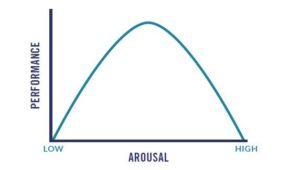Risk-taking is by definition a little (or a lot) scary, but it can also reveal the best in us. When we’re acting out our convictions and putting concrete action to our deeply-held values, the risks are generally worth it, and can actually be an exciting, positive thing rather than a frightening one.
In 1908 two American psychologists, Robert Yerkes and J.D. Dodson, began researching the relationship between arousal and peak performance. Their work resulted in the establishment of the Yerkes-Dotson Law, which suggests that performance increases with mental and physiological arousal…but only up to a point. After reaching a certain threshold, arousal (such as that caused by anxiety/fear) has diminishing performance returns.
The upward part of the curve below can be thought of as energy-producing, while the downward part of the curve can be thought of as energy-sapping (e.g., stress). Facing a personal risk, one needs to consider the severity of the potential outcomes, and the likelihood of that outcome occurring. The threshold at which arousal begins to have diminishing returns is unique to each individual, but the curve will look pretty similar to this:

So how do we make sure we’re finding the right mix of risk, and that we’re taking them for the right reasons? Let the five P’s of Risk guide you! If your risk meets all these thresholds, you should feel good about moving forward.
PASSION:
By arousing the strongest, most untamed parts of our nature, and stirring up the wild mustangs in our soul, our passion gives us the raw energy and wherewithal to suffer through the anguishing moments that often accompany risk. If the risk might end in a positive outcome you’re particularly passionate about, you’ll weather the storm.
PURPOSE:
Purpose serves to harness our passions and give them direction. Ask, “How will this risk make me a more complete person? How will this risk further my life’s purpose? How will it help me get to where I want to go?” A clear answer to these questions can serve as a visible goal to keep you determined through the difficult moments of risk.
PRINCIPLE:
The “right” risks are governed by a set of values that are both essential and virtuous. Risks are essentially decisions, and when facing a decision of consequences, principles form a set of criteria against which the risk can be judged. If it aligns with your beliefs and goals, you can feel better about taking the dive. (And trust me on that—the cover of one of my books on risk has a photo of me literally jumping—on fire—from a high-dive in front of 2000 spectators. I know all about a risky dive!)
PREROGATIVE:
Will you be taking this risk as a matter of personal choice, or because someone imposed it on you? Generally, risks that are an exercise of our own free will turn out better than ones we take on the orders of someone else. Smart risk takers view the power to choose as a privilege, and then honor it as such. By consistently making choices at a conscious level, they are better able to make superior judgment calls at an instinctual level—in fastmoving situations.
PROFIT:
A meaningful risk should come with a real potential for gain. Risks are, well, risky. And in exchange for assuming the potential risk of hardship, you are entitled to some real and unequivocal upside—if you weren’t, the potential downsides have nothing to counterbalance them. Notice, however, that Profit is the fifth “P.” It’s the criteria that should be assessed last. Lead the decision-making with your passion and principles, and then back it up with logical profit assessment before committing.
Want to learn more tips on how to take risks more thoughtfully and decisively while reducing the chance of wiping out? Check out Risk Taking and Decision Making: How to Stack The Odds In Your Favor, a workbook from Giant Leap’s head-risk-taker and Fortune 500 business coach Bill Treasurer. Designed for quick study and applied use, the book will help you take smart and beneficial risks in your business and personal life.



